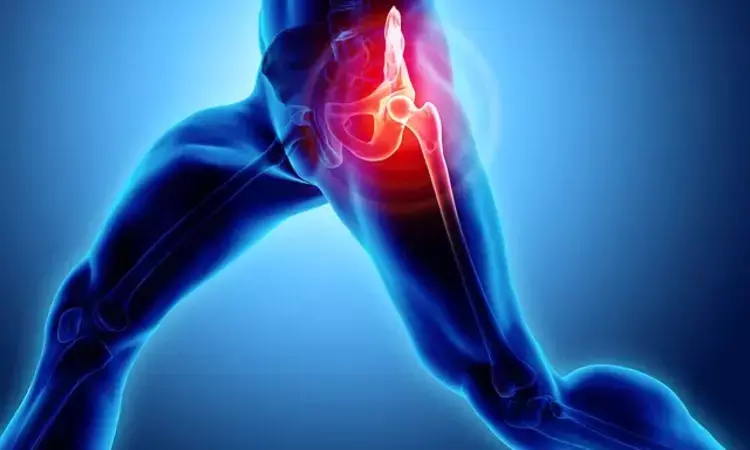- Home
- Medical news & Guidelines
- Anesthesiology
- Cardiology and CTVS
- Critical Care
- Dentistry
- Dermatology
- Diabetes and Endocrinology
- ENT
- Gastroenterology
- Medicine
- Nephrology
- Neurology
- Obstretics-Gynaecology
- Oncology
- Ophthalmology
- Orthopaedics
- Pediatrics-Neonatology
- Psychiatry
- Pulmonology
- Radiology
- Surgery
- Urology
- Laboratory Medicine
- Diet
- Nursing
- Paramedical
- Physiotherapy
- Health news
- Fact Check
- Bone Health Fact Check
- Brain Health Fact Check
- Cancer Related Fact Check
- Child Care Fact Check
- Dental and oral health fact check
- Diabetes and metabolic health fact check
- Diet and Nutrition Fact Check
- Eye and ENT Care Fact Check
- Fitness fact check
- Gut health fact check
- Heart health fact check
- Kidney health fact check
- Medical education fact check
- Men's health fact check
- Respiratory fact check
- Skin and hair care fact check
- Vaccine and Immunization fact check
- Women's health fact check
- AYUSH
- State News
- Andaman and Nicobar Islands
- Andhra Pradesh
- Arunachal Pradesh
- Assam
- Bihar
- Chandigarh
- Chattisgarh
- Dadra and Nagar Haveli
- Daman and Diu
- Delhi
- Goa
- Gujarat
- Haryana
- Himachal Pradesh
- Jammu & Kashmir
- Jharkhand
- Karnataka
- Kerala
- Ladakh
- Lakshadweep
- Madhya Pradesh
- Maharashtra
- Manipur
- Meghalaya
- Mizoram
- Nagaland
- Odisha
- Puducherry
- Punjab
- Rajasthan
- Sikkim
- Tamil Nadu
- Telangana
- Tripura
- Uttar Pradesh
- Uttrakhand
- West Bengal
- Medical Education
- Industry
High Intramuscular Fat Linked to Higher Risk of Knee and Hip Osteoarthritis: Study

China: A recent longitudinal cohort study has identified a strong association between thigh intramuscular fat infiltration (IMFI) and knee and hip osteoarthritis onset. The UK Biobank study revealed that higher thigh IMFI significantly elevated the risk of knee and hip osteoarthritis.
'Individuals in the highest quartile for anterior IMFI had a 2.34-fold greater risk of developing knee osteoarthritis. In contrast, both anterior and posterior IMFI were linked to hip osteoarthritis, regardless of BMI and sex. The findings indicate that reducing IMFI could play a role in osteoarthritis prevention," the researchers reported in Arthritis & Rheumatology.
Thigh intramuscular fat infiltration has been associated with metabolic inflammation and muscle dysfunction, which may play a role in osteoarthritis progression. However, its direct impact on knee and hip osteoarthritis development remains unclear. Therefore, Yilun Wang, Department of Orthopaedics, Xiangya Hospital, Central South University, Changsha, China, and colleagues aimed to investigate the longitudinal relationship between thigh IMFI and the incidence of knee and hip osteoarthritis, addressing a significant gap in existing research.
For this purpose, the researchers conducted a cohort study using UK Biobank data, including participants with baseline thigh intramuscular fat infiltration (IMFI) assessed via MRI and no prior history of knee or hip osteoarthritis. The analysis included 24,224 and 24,221 participants for anterior and posterior thigh IMFI with knee osteoarthritis, respectively, and 24,767 and 24,764 for hip osteoarthritis. Cox proportional-hazard models were used to estimate hazard ratios (HRs) for incident clinically diagnosed knee or hip osteoarthritis, adjusting for potential confounders.
Based on the study, the researchers reported the following findings:
- Over a mean follow-up of 4.8 years, 472 participants developed knee osteoarthritis, while 387 developed hip osteoarthritis.
- Increased IMFI in the anterior thigh was significantly linked to a higher risk of knee osteoarthritis, with adjusted hazard ratios (HRs) of 1.78, 2.00, and 2.34 across the second to fourth quartiles, respectively.
- Both anterior and posterior thigh IMFI showed a significant association with hip osteoarthritis.
- A dose-response relationship was evident in restricted spline models.
- Interaction and subgroup analyses confirmed that the impact of IMFI on osteoarthritis risk was independent of body mass index and sex.
The study highlights a significant link between elevated thigh intramuscular fat infiltration (IMFI) and a higher risk of developing knee and hip osteoarthritis. These findings suggest that IMFI contributes to joint degeneration, independent of traditional risk factors such as body mass index and sex.
"Given the growing burden of osteoarthritis, interventions aimed at reducing IMFI—through targeted lifestyle modifications, muscle-strengthening exercises, and metabolic regulation—could play a crucial role in prevention and disease management. Addressing IMFI may help mitigate the impact of osteoarthritis and improve long-term joint health," the authors concluded.
Reference:
Weng, Q., Jiang, T., Yang, T., Zhang, Y., Zhang, W., Doherty, M., Wei, J., Wang, Y., Lei, G., & Zeng, C. Association of thigh intramuscular fat infiltration with incident knee and hip osteoarthritis: A longitudinal cohort study. Arthritis & Rheumatology. https://doi.org/10.1002/art.43159
Dr Kamal Kant Kohli-MBBS, DTCD- a chest specialist with more than 30 years of practice and a flair for writing clinical articles, Dr Kamal Kant Kohli joined Medical Dialogues as a Chief Editor of Medical News. Besides writing articles, as an editor, he proofreads and verifies all the medical content published on Medical Dialogues including those coming from journals, studies,medical conferences,guidelines etc. Email: drkohli@medicaldialogues.in. Contact no. 011-43720751


